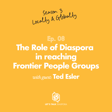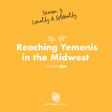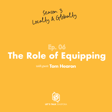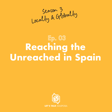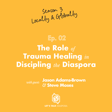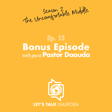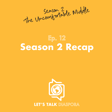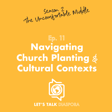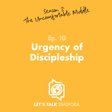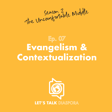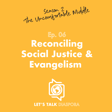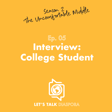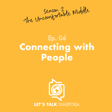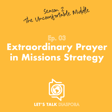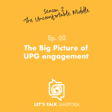Introduction to Global Gates and Mission Shift
00:00:02
Speaker
Are you a pastor, ministry leader, or volunteer? Perhaps a stay-at-home parent, business executive, or college student. Do you desire to see the nations come to faith in Jesus Christ? Let me tell you something fascinating. Something that is happening in our lives that's never happened before. The nations are coming to us.
00:00:23
Speaker
Yes, where we once had to travel across the world to share the gospel, the nations are now coming to North America through means of business, tourism, university study, and more. The world's most unreached people groups are coming to us. The next best question to ask?
00:00:42
Speaker
How do we reach them with the gospel?
Joining Global Gates Mission
00:00:44
Speaker
I want to introduce you to a missions organization called Global Gates. Global Gates exists to reach the ends of the earth through Global Gateway Cities. You too can be involved in this mission from wherever you are. Simply go to globalgates.info for more information.
00:01:10
Speaker
Welcome to let's talk diaspora. I'm bud. I'm joined by Rebecca and our guest today is David and David's going to be sharing his story of reaching the unreached through the diaspora. I guess that would be the right word is through the diaspora. And so I'm just super encouraged to know this brother and to hear, to hear from him. So welcome to the podcast, David.
00:01:41
Speaker
Thank you for inviting me. My name for now is David. That's right, for now. David, just begin to tell us about yourself, like where you're from, how you came to follow Jesus, and we'd just love to get to know you.
David's Ethiopian Roots and Gospel Encounter
00:02:00
Speaker
David is born and grown.
00:02:03
Speaker
the capital city of Ethiopia, or North Africa at this ababa on the street of Mexico, a street called Mexico in Africa. And my parents are religious in a sense, like everybody follows who are some kind of religion, but in Ethiopia, somehow
00:02:32
Speaker
Our Legion, especially my parents, because they are from Pagan part of the world, their Legion is mixed up or seen criticized with Muslim Orthodox and some kind of Paganism.
00:02:54
Speaker
But they call themselves Orthodox and they have never, I have never, I had never heard the name Jesus or anything that says Jesus or the gospel in my parents' life. And my teenage life was very hard.
00:03:22
Speaker
full of a lot of suffering. I lived on the street as a kid. And one because of my behavior, I was like, my teenage life was like evil in any sense. I did everything bad on the street, like, you know, in Ethiopia.
00:03:49
Speaker
When you are a street boy, first it is hunger, everything, then it becomes like stealing and fighting, violence. I did pass through all of that, but one day
00:04:06
Speaker
This young boy, he was maybe on my age at the time. He never been in the church. He was not a believer, but his elder brother was a believer. And he heard the gospel. He never read a Bible. He never saw a Bible in his life, but he knew something about the Bible from his elder brother. At that time,
00:04:35
Speaker
Christianity was in persecution, his elder brother was in prison, and he decided to share this story with me.
Journey to Faith and Transformation
00:04:45
Speaker
His reasoning was
00:04:48
Speaker
I was like a bad boy, bad apple in that neighborhood. He told like if he tells me the story of Jesus, my behavior becomes somehow better. But he didn't take it for himself.
00:05:08
Speaker
Then he told me, he didn't know how to share the gospel, but he tells me about Adam and Eve, how they were born seen. Then he told me about David and he tells me here and there everything. Then he lastly came to Jesus. He told me about Jesus. That was the first time I heard about Jesus.
00:05:34
Speaker
And he tries to remember what his elder brother told him and he told me about Jesus. And sitting there on the street, for me, it was life transforming, life changing. I never heard the gospel before. This young boy tells me about Jesus. This is for the first time. The Jesus that loves sinners.
00:06:04
Speaker
the Jesus that speaks to prostitutes and murderers and the Jesus that says you are forgiven and never heard about this story and as I am hearing my life was changing and yeah I am
00:06:28
Speaker
from that day on I'm transformed. But he didn't know what to do with me. And by the way, he became my first convert. And the next day my life is changing, but he didn't know how to decipher. He didn't know. He never read the Bible. But I asked him, do you have anything to read? He said that
00:06:56
Speaker
He had to ask his elder brother. And we have to find his elder brother. And then I found the Bible. I read throughout the Bible. And he became my first convert. Then my life changed. I want to mention something here. The power of the gospel.
00:07:18
Speaker
and the power of the Holy Spirit that works through the Gospel, whether through a believing person or an unbelieving person or on the paper or on radio or radio, podcasts, whatever, I tell you the power of the Gospel is powerful to transform, change lives. And I want to say also, imagine
00:07:42
Speaker
If an unbeliever sharing the gospel with me that transformed all my life, imagine if a believing person, it doesn't matter whether you are charismatic, whether you are speaking in a cool voice, a small voice, whatever, you share the gospel, you are a believer, the gospel is powerful.
00:08:11
Speaker
It can transform not because of your charisma, because of whoever you are, but because of the power of the gospel. Amen. I just love that an unbeliever brought you to faith, and then he was your first convert. You returned the favor.
00:08:34
Speaker
Yes, I did that. That is how we talk when we talk. Yeah, I return it my favor.
00:08:45
Speaker
Well, and what an encouragement to us to be the gospel. I mean, just speak the gospel, talk about Jesus and let the Holy Spirit do what he does. And also just thinking about how God did choose you from where you were. Tell us a little more about where God's taken you from that point and sharing with your first convert to where you are now.
Spreading the Gospel as a Student
00:09:13
Speaker
after that, my life changed. I was a high school student in those days. A high school student at that time, it's not common not to read English and understand English, even though our national language is Amharic. In high school, you learn English, but it wasn't for me.
00:09:40
Speaker
I couldn't read English. I didn't understand any school. But after my life is transformed, everything changed. I became a good student. I became an example in the school. I mean, in every way, God transformed my life. Because of that, that opened a door in my school because everybody knew me for my bad behavior.
00:10:11
Speaker
And now they know me something happened in me. What happened? Because something happened. Something wonderful. The name wonderful came to my life. The counselor and the name Jesus that heals transforms life. I started to preach the gospel. On the street, in the school, after that, in the hospital, every chance I got, I started to preach the gospel.
00:10:40
Speaker
Then I scored a good result, went to college to study medicine. And then I was preaching the gospel for teachers and students in high school. And my life motto was like, you know, act chapter one, verse eight, and Matthew chapter 28, 19 to 20. I mean,
00:11:08
Speaker
The church in Ethiopia, when I accepted Christ as my personal savior, was underground. After that, the regime changed. Door opened for us to preach the gospel on mass media everywhere. And we start to preach the gospel. In Ethiopia, churches are not mission-oriented.
00:11:33
Speaker
They don't just send missionaries like American churches do. But this is how I got my context. I mean, I was very convinced and challenged by this scripture, Matthew 28, 19 to 20, that says go to all nations.
00:11:56
Speaker
because all authority has been given to me. By the power of this authority I'm sending you, I took this is for me and it's for everybody. The second is act chapter 1 verse 8. I mean,
00:12:13
Speaker
It says that go, beginning from Jerusalem, go to Judah, Samaria, to the ends of the earth. This is how I put it. To go to where you are, nearby, near far, and far. It's our mission to go to these places.
Ethiopian Mission Challenges
00:12:30
Speaker
How can we go? I mean, by any means, I mean, in the Book of Acts, they were not willing to go. But in chapter seven,
00:12:42
Speaker
persecution came in chapter eight, verse one, because of the persecution, they were scattered to all over the world. And the Bible says this, wherever they are, wherever they were scattered, they were preaching the gospel.
00:13:03
Speaker
Then we started to challenge people because of economic reason, because of political reason, who were, I mean, going to everywhere, like part of Sudan or Egypt or Middle East, everywhere.
00:13:19
Speaker
We challenge our people to share the gospel. That is why God is even bringing challenges to our country. That is why we have war. That is why we are in poverty. That is why famine. I mean, God uses every means.
00:13:37
Speaker
that is happening to the country so that to bring the gospel to the unreached people group, to the nations that have never heard the gospel. And there was one challenge we had. The challenge we had was our people went to everywhere. I mean, you can find our people in Somalia, you can find our people in Dubai.
00:14:05
Speaker
in Saudi. Wherever they go, they come together to worship God. They preach the gospel. But this is not only for our people. Even this is how I quote for our people, wherever they are, they go. It's Acts chapter 11 verse 19 says this. Wherever they were scattered, they were preaching the gospel.
00:14:33
Speaker
they were preaching only for the Jewish. For years, our people, wherever they go, they preach the gospel only for their own people. It happens. They use Amharic to worship God. Now, this is what we tell them. Even disciples were doing this, but God brought people
00:14:56
Speaker
who have no names, they are not apostoles, they are not pastors, but some people from Cyprus to preach the gospel, not only for the Jewish, but for the Greeks, Arabs, Middle East, for everybody, then the church and your church was planted. And this is what I tell them. We are not called to preach only for Ethiopians.
00:15:21
Speaker
We are called to preach to bring the gospel cross-culturally to every ethnic group for all the nations. And now imagine, I mean, we send missionaries because churches in America are mission oriented. God bless them. We have learned a lot from them. They are the ones who brought the gospel to Africa. And that is why we heard the gospel.
00:15:49
Speaker
But our people, they think like missionaries are always whites and we tell them, no, they're not. Acts chapter 1, 8 never mentioned about money, never mentioned about prosperity, never mentioned. Just told them, Holy Spirit comes, we'll receive power and you preach the gospel. Then imagine our ladies, one example.
00:16:16
Speaker
Because of the poverty in Ethiopia, farmers sometimes sell their cows and cattles and buy tickets and send their ladies, their young girls into Arab countries to work, to be handmade.
00:16:38
Speaker
And then at the time, our pastor, one of our team worker was in Sudan. We had a training center in Sudan. And many people come to Sudan, then from Sudan, go to Middle East. Then we decided to have a training center there. And the training center's purpose was this.
Empowering Ethiopian Women as Missionaries
00:17:03
Speaker
And we thought we are not sending these girls or men, young boys to Middle East, but anyway they are going. But let us equip them so that when they go, they can preach the gospel.
00:17:18
Speaker
Then we started to teach them Arabic. We started to teach them about cross-cultural. And we started to tell them that the reason you are going is not to make money, not to make bread. You're going there as a missionary. It's God who is sending you there. We have a lot of example in the Bible. In Nehemons, the general house, there was a girl
00:17:44
Speaker
who was taken by power from Israel to work for him, but he shared the gospel and the general is saved. And he brought the good news to his people. And we tell them, this is how I tell them, imagine, if we send missionary from USA, from Europe, whatever, they go and rent a place and they do all their best, they are doing God bless them.
00:18:14
Speaker
But they have to work hard to connect with the people, Muslim people, with Islam, Arab people, to connect with these people and to speak to them, which is very difficult. But an Ethiopian girl who is coming from a rural area by the power of God, by the power of, you know,
00:18:41
Speaker
conditions, opportunities, whatever, goes straight to his home, straight to their bedrooms, straight to their families, straight to their children. And she learns their language, then speaks to them every day, every day, especially with madams.
00:19:05
Speaker
The madams, mostly, they are depressed, they look like they are fine, religious, but they need someone to share something, you know, then this girl is there with Jesus, with the power of the Holy Spirit. Now we tell them that is why you are there, share the gospel. After years working on this, now we start to hear, you know, Muslims coming to the goal.
00:19:36
Speaker
Like, you know, God using these girls. I mean, their prayers, even healing, we hear healing. People get healed, get saved.
00:19:48
Speaker
And this is, there is a time when God used Middle East to reach out the world. There is a time when God used Westerners to reach the world. And we feel like this is a time for God to use Africans to reach out the world. Anyway, in 2050, we are going to be the largest population in the whole world. Maybe one in four.
00:20:14
Speaker
But then we have to keep Africans to reach out the world. And this is one of the example I give. And God is working. God is using our people to reach out the enriched parts of the world. And before he comes soon, I hope he will do mighty works in our people.
00:20:45
Speaker
Can you tell us one of those stories of how he's been working?
Impact of Ethiopian Women Abroad
00:20:51
Speaker
Yes. There are a lot of stories, but one of the recent one is this girl is in the house working for Madame and her husband is going out most of the time. And one of her son, their son was sick for years and they took him to the hospital. They took him
00:21:13
Speaker
to, you know, their way of bringing people to their witchcrafts, to have healing, and they did everything. He was not healed. This girl came from Ethiopia, rural farming places, and she didn't even speak, well, Amharic, she speaks Oromina.
00:21:41
Speaker
one of the Ethiopian language spoken in Ethiopia. But she learned to speak Arabic and she was hired in this house. According to her, she's praying everywhere. When she make bed, she prays on the bed.
00:22:05
Speaker
When she cooks, she prays for the food. Lord, use this food. Bless this family. She goes in and out, she prays. And she prays for her boy. One day she told, Madam, you know, I know someone who can heal your boy.
00:22:26
Speaker
If you are willing, who can heal my boy? I want to take him anywhere. No, you don't have to take him anyway. He's here. His name is Jesus Christ. And Al-Masi'isah, he's here. You have heard about him. Yes, but not often. Then he shared the gospel with her.
00:22:52
Speaker
And she was willing, if she can pray for her son, she started to pray for her son. I mean, they started to see changes in his life. And she, the madam, see hope. And yeah, pray, please pray. You don't have even to work. Pray for my son. Her son was healed.
00:23:22
Speaker
God healed him. And when the husband comes, what happened? She shared the gospel with him about Jesus, Jesus Christ. And the next day, where are you going? Sunday, Friday, Sunday. Where are you going? I'm going to church. We want to go with you.
00:23:50
Speaker
the whole family came to the church. But the challenge was the church sometimes was not ready, you know. Now we're trying to
00:24:07
Speaker
You know, make house churches who speak Arabic or praise in Arabic who sings in Arabic. That church was not ready because they speak Amharic. Like English is your heavenly language. Amharic is our heavenly language. When I challenge
00:24:27
Speaker
or the Capian pastors in diaspora, I tell them, you think God speaks Amharic. I tell you, sometimes God speaks Arabic. Try to speak Arabic and learn Arabic if you live among Arabs. And yes, there are a lot of these stories like this. People get healed.
00:24:52
Speaker
people hear the gospel and not want to, a lot of stories. And now we tell them, don't bring them to the church. You can disciple them wherever they are, and then you can bring them to the houses where they can feel secure and be discipled. And that is our next stage in the future.
00:25:20
Speaker
We are trying to come back and forth, train girls. By the way, we call them not housemaid. We tell them you are not housemaid, you are house light. You are going there to shine light, the light of Christ in the dark place. Then you call yourself.
00:25:49
Speaker
I am the light of this house, house light. Wow. I just know from experience, and we even see this in the scripture, when we see God doing amazing things, there's often opposition and challenges that come.
Overcoming Missionary Challenges
00:26:10
Speaker
What are some of the challenges that you and the work face right now?
00:26:18
Speaker
The challenges are a lot of challenge, you know, as I told you, most of these bells are coming from Ethiopia. I mean, still the poorest country in the world economically.
00:26:34
Speaker
Sometimes for their parents to send them to Middle East, they have to sell all, sometimes the cuttles they have, you know, their living minces.
00:26:51
Speaker
And the other challenge is sometimes they, you know, the wrong people become like agents, you know, to bring them to this place like human traffickers, something like that, take advantage of them. When they go there, they take their passports.
00:27:15
Speaker
And they take their money. And even when they go to Middle East, in those parts of the places, even the owners, wherever they are working, they take their passports. Abuse is one of the challenge sometimes. Beating and a lot of these kind of challenge.
00:27:40
Speaker
And sometimes when they take their paper, when they escape from that place legally, it's difficult to live there. I mean, there are a lot of challenges. They become sometimes harmless.
00:27:59
Speaker
All these kind of challenges are going on. Because of sharing the gospel, there are even one of my closest friend who was imprisoned in one of the country for five years.
00:28:19
Speaker
prison. Then he was deported and then he went back to his country but he felt like he has a calling. He couldn't go to the same country but he changed a country close by and he went to, he was in Saudi Arabia, then he went to Bahrain.
00:28:46
Speaker
and he's doing the gospel, he's preaching the gospel right now at this time and recently I visited him, I trained his people and yes there are many kinds of challenges and we are trying
00:29:04
Speaker
to lessen or to reduce the challenge as much as we can by helping finding a place, a secure place sometimes when you
00:29:17
Speaker
They left their house. We are praying for that. God may give us, you know, if we have, if we can rent one place in one country when, where they can, you know, pray and have fellowship. And at the same time, when they leave their places, they can stay there, something like that.
00:29:44
Speaker
Yeah, stand with that in your prayer. Brother, can you tell us more about some, I mean, as you talk about challenges, I mean, I would hear some needs that could be there, but tell us some of your greatest needs and some opportunities, ways that people could help meet some of these challenges, the needs.
Resource Needs for Ethiopian Missions
00:30:11
Speaker
Let me put it this way.
00:30:16
Speaker
Let me start from back Ethiopia. In Ethiopia, for example, we decided that instead of just waiting down there in Arab countries and go there, why don't we meet them here in the country?
00:30:35
Speaker
you know, with two opportunities. For example, if we have like a volunteer, some kind of school that trains them Arabic, that trains them how to protect themselves, the girls. If they have difficulty problems, whom they can contact. If we do something like that, instead of them
00:31:05
Speaker
or sending them to the wrong people, we can have some kind of right kind of agency where we can have with mission intention, with preaching the gospel intentionally, we can have this kind of thing in Addis, we can have license, which is very difficult.
00:31:30
Speaker
To have a license, you need to deposit a lot of amount of money to have insurance from the government. They need that. And if we can do that, we can have a school where the girls don't have to pay money to go through the training, but we can give them the training. I am sure, I can tell you most Muslims will come there.
00:31:59
Speaker
to have the training, to have information, to go through what they need, how. I remember I was going to Middle East recently with my wife. I was sitting in my left hand, in my left side. This girl didn't know anything and she's sitting and food was served. And she said, I don't wanna eat.
00:32:24
Speaker
And I speak a little bit of Romania, her language. The lady that was, the hostess that was serving didn't know her language and she asked, why don't you eat? And she said, I don't have money. And then I talked to her, I asked her, you don't need money, it's already paid.
00:32:46
Speaker
I mean, they don't have this little information. They just come from a rural place. And if we can provide that, one, if they are unbelievers, Muslims that are coming, we can preach the gospel to them. Second, if they are believers, we can train them, equip them to be missionaries wherever they go.
00:33:11
Speaker
And we want to do that in Ethiopia and we want to do that at the same time in the Middle East, where we can connect our ladies where they can feel safe, where they can share the gospel. And for this, we need a resource, no question. We have been doing it without
00:33:38
Speaker
a lot of resource, no resource, all. I tell you, I told you that our churches in Ethiopia for years has not been mission oriented. My local church is large. My local church in Ethiopia was large, big, but never sent missionary. And when we sent our first person to Sudan, we sold everything we have incentive.
00:34:04
Speaker
because we believe that God is working and He's working and is still working. But if we have resources, we can do more resources, many kinds of resources, people praying for us.
00:34:21
Speaker
We are meeting Kevin, some of the people who are already there who can train, you know, with connection network that is created. God is helping us in that way.
00:34:39
Speaker
financial resources. We need that if any anyone wants to contribute through a global gate. They can contact Kevin and yes.
00:34:56
Speaker
Thanks for sharing those things. We'll put some contact information in the show notes and what ways you can get in touch. And it may be that we have just a generic email or even my personal email so we can filter those and make sure it gets to the right person.
00:35:18
Speaker
But brother, you are such an encouragement to me just how God is working.
Role of Global South in Missionary Movement
00:35:25
Speaker
And I do believe that the global South is the mission force for the 21st century. Africa, Latin America. And so just if you're from the United States or Canada or Europe and listening to this, we just have to realize
00:35:42
Speaker
Uh, we still have a role to play. It's just not the same role we played last century. And, uh, we, we get, we get to enjoy seeing people like you, uh, the Ethiopian church, the, the Brazilian church, uh, really own the great commission. And I believe that that, that is the joy of the diaspora that it is local, but it's also global.
00:36:14
Speaker
Thank you for coming and joining us today, David. I've been very encouraged as well as really beginning to pray now how I can continue to pray or even be involved in the work because it's exciting to hear what God's doing. He's definitely doing a lot in and through you as well as many others, brothers and sisters from Ethiopia. And it's a great encouragement to all of us.
00:36:43
Speaker
So is there anything else that you would like to share? We don't want to miss out on anything that you may wanted to share that we didn't get a chance to hear.
Engaging in Local Cross-Cultural Missions
00:36:54
Speaker
If I get the chance, as I always say to people who are living in USA, Americans, and whether it's in Canada, America, who will not cross a country or go to country, I tell you,
00:37:12
Speaker
Never in history I think happened like this, globalization, and people from these places, from Arab Middle East, people from Afghanistan, Pakistan, are coming to your door.
00:37:27
Speaker
They are here. And don't even think only about those who are doing God's work in Middle East. You can do mission cross-cultural work wherever you are.
00:37:43
Speaker
And here in Austin, I meet with Sudanese, Afghans, Pakistanis. A lot of people invited them to my house with my wife, prayed with a lot of them, and shared the gospel in our neighborhood. There are a lot. We go to mosque. We can find them. I mean, you know, by reaching them here in USA, in Canada, wherever you are,
00:38:13
Speaker
I mean, you go back to their houses, they take the news back to their homes. And this is not the time to sit. We should not, I always say, the harvest is plentiful, but the workers are few. If I'm allowed, I always add this, I'm not sure if this is a right English,
00:38:42
Speaker
But in my Amharic, I say this, they are not only few, they are lazy.
00:38:51
Speaker
They are passive. We are passive. We are lazy. I am lazy. And people are dying. And they're not supposed to be. There is persecution in Middle East, in Pakistan, Afghans. But not here. I can go to mosque and preach the gospel. We can go to wherever. We can knock their doors.
00:39:19
Speaker
Hopefully they don't shoot us. It's not. Most of the time, and this is all I can say, I encourage each and every, everyone, there is power, the power of the gospel in you. You have this good news and you can't sit, you can't be neutral, you can't let's preach the gospel. And thank you for inviting me. God bless you. God bless your ministry.
00:39:51
Speaker
Thank you, brother. Thank you, David. I really appreciate you. And thank you all those that have been listening to Let's Talk Diaspora. Please send us a note. Please finish a review. Share more with others to listen and join us. And we'll be back with you soon.

